Africa. UN Peacekeeping missions in crisis.
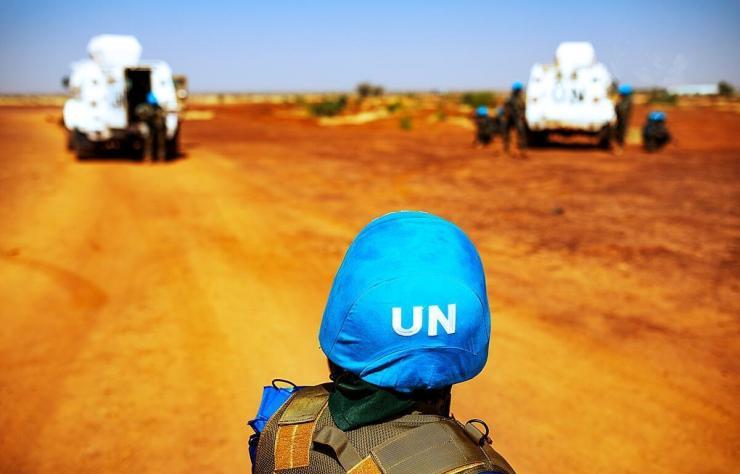
Last June, the UN Security Council ended the mandate of MINUSMA in Mali while the DRC government announced the end of MONUSCO’s mandate within six months. There are also tensions between MINUSCA and the Central African government.
Increasingly, African fragile states are banking on private military companies to regain control of their territory.
On the last 30 June, the UN Security Council decided unanimously to end the mandate of MINUSMA, the UN Multidimensional Integrated Stabilization Mission in Mali, following the Bamako authorities’ request for an immediate withdrawal of the blue helmets. As a consequence, the Council adopted resolution 2690 to organise the cessation of its operations, the transfer of its tasks, and the withdrawal of its personnel before 31 December 2023.
This is not the first time a UN mission in Africa has been kicked out: in 2010, the UN operation in Chad (MINURCAT) was asked to leave by President Idriss Déby.
MINUSMA is the UN’s largest operation with a $ 1.26 billion annual budget and 17,430 personnel as against $ 300 million and several hundred staff in the Chadian case.
MINUSMA was established by the Security Council in 2013 after an uprising in northern Mali by armed groups linked to al-Qaeda. Ten years later, its efficiency is questioned by the authorities. The Malian interim government, formed in the wake of the 2020 and 2021 coups, justified its request, citing a “crisis of confidence” with the UN. MINUSMA “has certainly not achieved its fundamental goal of supporting the efforts of the government in securing the country”, said the Malian ambassador to the UN, Issa Konfourou, after the vote.
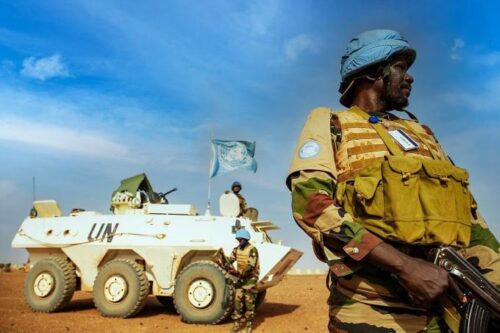
MINUSMA Peacekeepers in Ménaka Region in Mali. UN Photo/Harandane Dicko
On the 1st June 2023, the UN Secretary General, Antonio Guterres admitted that fighting was continuing in the North, with Islamic State in the Greater Sahara expanding the area under its control. Meanwhile, in Central Mali, groups affiliated with Jama’a Nusrat ul-Islam wa al-Muslimin still pose a significant threat. Between July 2022 and May 2023, 1,002 civilians died and 445 others were injured because of armed conflict. These unsatisfactory results coincided with some 300 fatalities for MINUSMA, making it the deadliest UN peacekeeping operation worldwide. The relations between the UN and Mali also deteriorated sizeably after the publication of a report in May 2023 accusing the Malian Armed Forces and the Russian mercenaries of the Wagner Group to have committed a massacre of 500 civilians at Moura, in Central Mali, in March 2022. The UN withdrawal could bear many consequences. Armed group signatories to the 2015 peace agreement referred to MINUSMA’s departure as a “fatal blow” to the peace process. Several northern armed groups already withdrew from the peace agreement in December 2022. Other sources suggest that such withdrawal will embolden jihadists and put an end to the protection of humanitarian aid operations. The departure of the UN could also deprive the authorities of the UN logistical support for the elections in 2024.
MINUSMA’s departure is also likely to worsen Mali’s international standing, possibly leading to further reductions in international donor engagement. Inevitably, Mali will be more dependent on Wagner. Finally, the departure of MINUSMA raises questions about the future of UN peacekeeping worldwide, says a former political advisor of MONUSCO, the UN Stabilization Mission in the Democratic Republic of Congo.
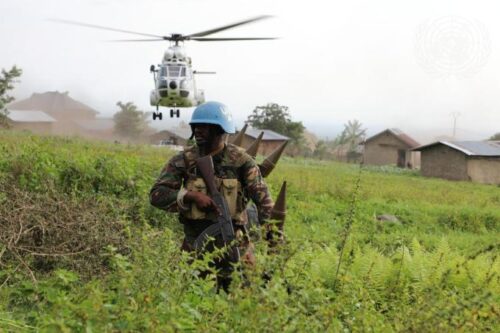
MONUSCO Helicopter Operates in Mutwanga, North Kivu. UN Photo/Michael Ali
The days or months of MONUSCO itself are numbered as well. MONUSCO is the third largest UN peacekeeping operation concerning its budget ($ 1.12 bn) after MINUSMA and UNMISS, the UN Mission in South Sudan, whose budget reaches $ 1.2 bn. It is also the third largest in size with a staff of 17 753 after UNMISS (17 954) and MINUSCA, the UN Multidimensional Integrated Stabilization Mission in the Central African Republic (17,885). MONUSCO, is present in the DRC since 1999. Yet, Kinshasa announced on 13 June 2023 the withdrawal of MONUSCO within six months.
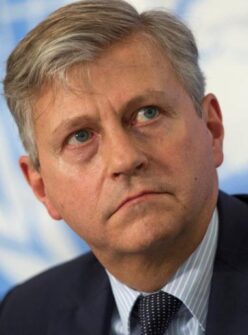
The United Nations Under-Secretary-General for Peacekeeping Operations, Jean-Pierre Lacroix said that the blue helmets would leave Congo “as soon as possible”. UN Photo
The Under Secretary General for Peacekeeping Operations, Jean-Pierre Lacroix on a visit to Kinshasa on the last 7 June declared that the blue helmets would leave Congo “as soon as possible” but “in a responsible way”. Accordingly, some conditions must be met beforehand. The list includes the decrease of security risks, of the negative impact of armed groups and the increase of the capacities of the Congolese army. On 19 June, MONUSCO’s boss, Bintou Keita confirmed that the departure of MONUSCO was on track but that the withdrawal should take place in a peaceful and worthy way. Besides the conditions mentioned by Lacroix, she spoke of the implementation of the Disarmament, Demobilization and Reinsertion of armed group fighters and the organization of credible, transparent, and peaceful elections on time, in December 2023 as prerequisites.
The Congolese Minister of Communication, Patrick Muyaya, said that no date for such withdrawal could be fixed yet. But the Kinshasa government is adamant to put an end to MONUSCO’s mandate. Since 15 November 2022, it is putting pressure on the UN to leave the country. The UN presence in the DRC has become unpopular. By the end of July 2022, angry youth demonstrated against MONUSCO in several cities of Eastern Congo, calling for its withdrawal. Their grievance is that MONUSCO failed to end insecurity in the area.
The lack of combativity of the blue helmets, accused to be “per-diemists” and to be only concerned with cashing high salaries and daily allowances is blamed by the local people. The UN already closed offices in the Kasai and Tanganyika provinces.
In an interview with Radio France Internationale, on 19 September 2022, the UN Secretary General, Antonio Guterres admitted that MONUSCO was unable to fight successfully against the M23 rebels who are active at the Rwandan and Ugandan borders. Accordingly, the M23 is a modern army, with heavy equipment which is more sophisticated than MONUSCO’s one. The statement infuriated Kinshasa. According to Congolese Foreign Minister, such statements are demoralizing Congolese troops.
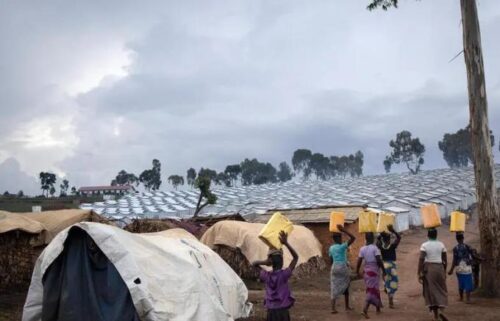
MONUSCO’s departure will leave thousands of internal displaced persons in Eastern Congo without protection. © UNHCR/Hélène Caux
Nevertheless, MONUSCO’s withdrawal could be postponed for another year since President Felix Tshisekedi needs the UN logistical assistance to transport the ballot boxes and the election kits and to compile the results as it did for previous elections in 2006, 2011 and 2018. Meanwhile, the Congolese authorities have already prepared the alternative by hiring mercenaries. A Bulgarian-registered company called Agemira RDC, led by French businessman Olivier Bazin, signed a deal in May 2022 for the refurbishment and the maintenance of two Russian-made Sukhoi SU-25 fighter aircraft and of two MI-24 attack helicopters, manned by Georgian pilots, on the Goma airbase.
Hundred military instructors from the Romanian private military company Associata RALF led by former French legion officer, Horatiu Potra, arrived in Goma at the end of 2022. Previously Potra trained the Emir of Qatar’s guard and worked as an instructor of Faustin-Archange Touadera’s presidential guard, in the context of a Russian contract. Another consequence of MONUSCO’s departure would be to leave thousands of internal displaced persons in Eastern Congo without protection and to stop reporting about human rights violations.
The mandate of the UN Multidimensional Integrated Stabilization Mission in the Central African Republic (MINUSCA) expires on 15 November 2023. Since the end of MINUSMA, this mission stands now as the most important UN peacekeeping operation both in terms of budget ($ 1.26 bn) and staff numbers (17,885). Its priorities consist in protecting civilians, the rule of law and humanitarian aid, supporting the peace process, the implementation of the ceasefire and the reform of the security sector and the disarmament, demobilization, reintegration and repatriation program.
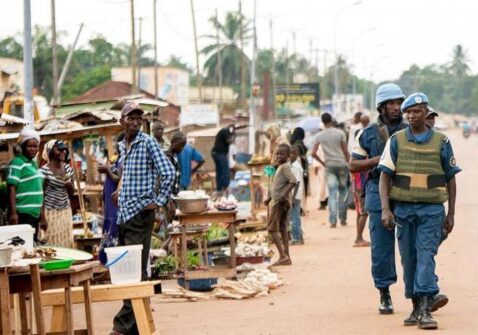
The mandate of the MINUSCA expires on 15 November 2023. UN Photo
Like other UN missions, MINUSCA is criticized for the misbehaviour of some of its members. On the last 21 June, it decided to repatriate the Tanzanian blue helmets accused of sexual abuse like their colleagues from DRC and Gabon who were repatriated earlier for the same reason. Over the last few years, many other incidents occurred between MINUSCA and the local population. On 21 February 2022, four French soldiers of MINUSCA were arrested at the Bangui airport by the Central African Armed Forces (FACA). In November 2021, the presidential guard shot on a bus transporting Egyptian members of the UN Police and injured ten of them. During that month, the Portuguese Justice revealed that former MINUSCA members of the Portuguese Special Forces were involved in diamond trafficking.
These incidents contributed to deteriorate of the climate between local authorities and MINUSCA, especially after the deployment of 1,200 Wagner mercenaries in 2018 in the context of an agreement with Moscow. These mercenaries have been accused of human rights violations but they have also allowed the Bangui authorities to regain control of most of the cities of the country, point out analysts.
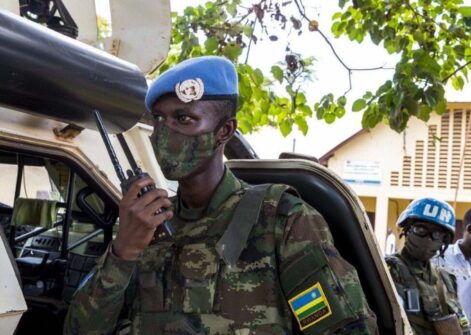
Rwandan peacekeeper in CAR.
MINUSCA’s future seems however less fragile than MINUSMA’s since its relations with Wagner and President Faustin-Archange Touadera are less tense than the UN relationship with the Malian leadership. Unlike in Mali, the blue helmets and Wagner are collaborating with each other, reported the French paper Libération on 5 July 2023.
A key element in the cohesion of the pro-government side in the CAR, is the presence of 2,100 Rwandan troops within MINUSCA and the simultaneous presence of 1,200 Rwandan Defence Force soldiers alongside the FACA in the framework of a bilateral agreement between Bangui and Kigali. Unsurprisingly, all these Rwandan soldiers communicate with each other, which helps to avoid incidents.
A strategic alliance has been set up by Presidents Touadera and Paul Kagame, which goes beyond military services. More than 100 Rwandan companies are registered in the CAR in a number of activities including transport, logistics, tourism, agriculture and real estate. A subsidiary of the Rwandan Crystal Ventures holding has obtained a 25 years concession to open five mines, whereas another company called Afrika Oko is active in the gold and diamonds sectors. To some extent, Rwanda and Wagner have a vested interest in maintaining a working relationship to preserve stability and thereby their respective businesses. (The Egyptian contingent of MINUSMA, based in Douentza in the Mopti region of central Mali. UN Photo/Harandane Dicko)
François Misser



